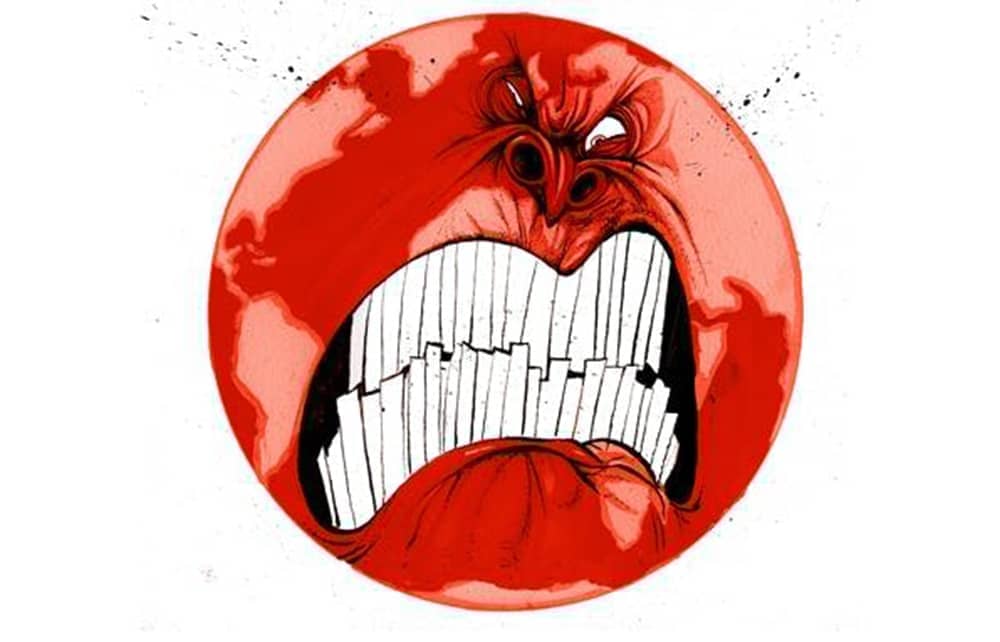I love Suffolk, not just for its beauty but for the stories to be found all around me. Every day I swim with my two-year-old labrador in the river Alde with views of the strange pagodas built on Orford Ness, a long strip of shingle. Amazingly, components of the nuclear bomb were tested here during the second world war. Just up the coast is the wonderfully named Cobra Mist, a radar station active during the Cold War. If you’re lucky enough to go inside, you’ll find computers and surveillance equipment abandoned in the 1970s with lights still blinking and spools turning like something out of The Avengers. The US stealth bomber was apparently tested here. In 1980, UFOs were spotted above Orford on their way to Rendlesham forest. What a location for an author! Inspiration is everywhere I look.
And yet I have to work hard to keep the whispers of doom from my mind. Earlier this year I read Hothouse Earth by Bill McGuire, emeritus professor of geophysical and climate hazards at University College London, and it won’t leave me alone. If this short, cogently argued book has one fault, it’s that it leads to the inescapable conclusion that whichever way we look, it’s too late. We’re all doomed (and it was written before temperatures reached 40.3°C in the UK). It makes me wonder: am I sunbathing or becoming extinct? And how bad will it have to get – with wildfires, floods, melting icecaps, etc – before the switch is thrown and someone decides to… I don’t know… do something?
I mustn’t be hypocritical. I still fly, if considerably less than I used to, as Zoom – brilliant in some ways but still horrid and dehumanising – seems to have permanently replaced international literary festivals. I take public transport whenever I can. I have virtually given up meat (responsible for 14.5 per cent of global emissions, way more than aviation), and cut back on dairy although I’m still waiting for scientists to find an edible alternative to butter. I avoid single-use plastic and I recycle… But I notice the bottle banks in Orford haven’t been emptied for a fortnight and are buried under a glittering mountain of glass. It’s a sad sign of the times – and an indication of just how much folk drink around here.
Why is everyone so angry at the moment? Is it the hot weather, Brexit, Covid, the Tory leadership contest? I gave a harmless and, I thought, balanced interview last week which did, admittedly, skirt round ‘woke’ and ‘trans’ issues. As a result, my Twitter feed went crazy. Here’s some advice. If someone calling themselves feckoff&die or hate-u-lots999 sends you a message, don’t read it.
As for the Tory contest, I’m bewildered. Why isn’t Rishi Sunak streets ahead in this insane two-horse race? Insane because just 0.29 per cent of the population will choose our next PM for the third time in a row – and their last two choices went really well, didn’t they? Did none of them watch the Sky debate or Sunak’s solid BBC performance against a wily and forensic Nick Robinson? Liz Truss has refused even to face him. And what about the £50 billion a year that her policies will cost us, our children and their children?
Well, I would say all that, wouldn’t I? Although I’ve never met him, Mr Sunak employs my son, Cassian, as a special adviser. Cass has appeared a few times in the papers himself, which delights me because he can’t shake off the ‘son of…’ label. I think the Tory party is underestimating the dislike of the last prime minister by many in the country who may react against a continuation candidate, especially one threatening to derail the privileges committee. Really? Have we forgotten Owen Paterson so soon? Sir Keir Starmer must be having a wonderful summer.
How lucky I am to have two sons in the prime of life, both doing well. By the time you read this, one will be married and the other is engaged. The older I get, the more I have to remind myself that every generation comes to believe that the one that follows isn’t up to the job, when the exact opposite is true. I write books for young people so I still meet a great many and am always impressed by their good sense, manners and undiminished optimism. It made me smile that the editor who commissioned this diary mentioned that he studied at Bristol in the same class as Cass. I will go to my grave (St Bartholomew’s church, Orford) with the certainty that the country is going to be fine. Except, perhaps, for the next couple of years.
Anthony Horowitz’s new novel, The Twist of a Knife, is out now.






Comments